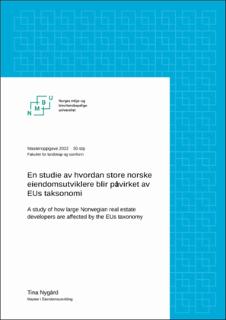| dc.contributor.advisor | Boge, Knut | |
| dc.contributor.advisor | Phan, Tin | |
| dc.contributor.author | Nygård, Tina | |
| dc.coverage.spatial | Norway | en_US |
| dc.date.accessioned | 2022-12-09T14:05:13Z | |
| dc.date.available | 2022-12-09T14:05:13Z | |
| dc.date.issued | 2022 | |
| dc.identifier.uri | https://hdl.handle.net/11250/3037052 | |
| dc.description.abstract | Vi befinner oss i det grønne skiftet preget av kontinuerlige endringer i måten å utvikle eiendom på. EUs taksonomi ble lansert i 2022, da hensikten med klassifiseringssystemet er å skape en felles forståelse av hva som er bærekraftig aktivitet, og den skal føre til et transparent marked som hindrer grønnvasking. I dag jobber eiendomsutviklere med å rette seg etter taksonomien, og i den sammenheng er problemstillingen: «Hvordan påvirker EUs taksonomi store norske eiendomsutvikleres arbeid med bærekraft og miljø?».
For å få innsikt i hvordan EUs taksonomi påvirker eiendomsutviklerne er teorigrunnlaget risiko i eiendomsutviklingsprosessens fase 1 til 4, samt teori innen forretningsmodell og organisasjonsendringer. Teorien om samfunnsansvar og den triple bunnlinjen blir benyttet for å forstå eiendomsutviklernes arbeid med bærekraft og miljø. Oppgaven bygger videre på tidligere forskning om EUs taksonomi og ulike perspektiver på eiendomsutvikleres økonomiske, miljømessige og sosiale forhold.
Dette er en kvalitativ casestudie, der datainnsamlingen er basert på et strukturert intervju av totalt fem informanter fra Aspelin Ramm, DNB, Entra, Møller Eiendom og OBOS. Undersøkelsen utvalgsstrategi er basert på at informantene må ha kunnskap om eiendomsutvikling, organisasjoners bærekraftsarbeid, og jobbe i store norske eiendomsselskap. Informanten fra DNB ble rekruttert gjennom snøballmetoden. Hensikten med intervjuet var å få økt innsikt i hvordan bankens grønne finansiering påvirker eiendomsutviklernes finansielle risiko.
Funnene tyder på at EUs taksonomi fører til økt risiko i tidligfase eiendomsutvikling. Dette grunnet begrepet bærekraft ikke er operasjonalisert i eiendomsbransjen og svekker eiendomsutviklernes handlingskraft. Taksonomien kan hemme entreprenørskap og innovasjon da taksonomien ikke er forankret i norsk kontekst. Behovet for bærekraftige ressurser øker, og det jobbes med å gjøre eiendomsutviklingen så lønnsom som mulig. Taksonomien mangler krav knyttet til den sosiale delen av bærekraftbegrepet, noe som kan redusere fokuset på folkehelsen og trivsel. Taksonomiens positive sider er at den hindrer grønnvasking og kan endre norske verdier, holdninger og antakelser rundt bærekraftig aktivitet. Det har blitt større fokus på hvordan bygget påvirker miljøet som helhet, og taksonomien er i ferd med å skape et bærekraftig marked med bærekraftige kunder. | en_US |
| dc.description.abstract | We are in the green transition characterized by continuous changes in the way to develop property. The EU's taxonomy was launched in 2022, when the purpose of the classification system is to create a common understanding of what constitutes sustainable activity, and it will lead to a transparent market that prevents greenwashing. Today, property developers are working to comply with the taxonomy, and in that context the problem is: «How does the EU's taxonomy affect large Norwegian property developers' work with sustainability and the environment? ».
In order to gain insight into how the EU's taxonomy affects property developers, the theoretical basis is risk in phases 1 to 4 of the property development process, as well as theory in business model and organizational change. The theory of social responsibility and the triple bottom line are used to understand the property developers' work with sustainability and the environment. The thesis builds on previous research on the EU's taxonomy and different perspectives on real estate developers' economic, environmental and social conditions.
This is a qualitative case study, where the data collection is based on a structured interview of a total of five informants from Aspelin Ramm, DNB, Entra, Møller Eiendom and OBOS. The sample selection strategy is based on the informants having knowledge of real estate development, organizations' sustainability work, and working in large Norwegian real estate companies. The informant from DNB was recruited through the snowball method. The purpose of the interview was to gain increased insight into how the bank's green financing affects the property developers' financial risk.
The findings suggest that the EU's taxonomy leads to increased risk in early-stage planning. This is due to the concept of sustainability not being operationalized in the real estate industry and weakening the real estate developers' power of action. The taxonomy can hamper entrepreneurship and innovation as the taxonomy is not rooted in the Norwegian context. The need for sustainable resources is increasing, and efforts are being made to make property development as profitable as possible. The taxonomy lacks requirements related to the social part of the concept of sustainability, which can reduce the focus on public health and well-being. The positive aspects of the taxonomy are that it prevents greenwashing and can change Norwegian values, attitudes and assumptions about sustainable activity. There has been a greater focus on how the building affects the environment, and the taxonomy is in the process of creating a sustainable market with sustainable customers. | en_US |
| dc.language.iso | nob | en_US |
| dc.publisher | Norwegian University of Life Sciences, Ås | en_US |
| dc.rights | Attribution-NonCommercial-NoDerivatives 4.0 Internasjonal | * |
| dc.rights.uri | http://creativecommons.org/licenses/by-nc-nd/4.0/deed.no | * |
| dc.subject | Bærekraftig utvikling | en_US |
| dc.subject | Eiendomsutvikling | en_US |
| dc.subject | Sustainability | en_US |
| dc.subject | Real estate development | en_US |
| dc.title | En studie av hvordan store norske eiendomsutviklere blir påvirket av EUs taksonomi | en_US |
| dc.title.alternative | A study of how large Norwegian real estate developers are affected by the EUs taxonomy | en_US |
| dc.type | Master thesis | en_US |
| dc.description.localcode | M-EUTV | en_US |

